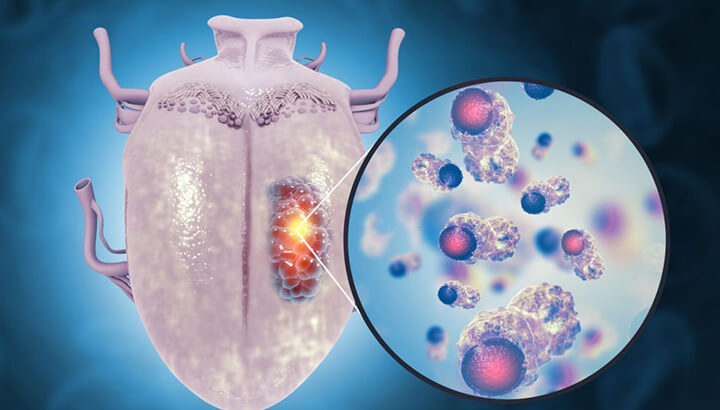
Oral cancer accounts for most head and neck cancers. About 90% of oral cancers are squamous cell carcinomas, where cancer occurs in the thin, flat cells lining the oral cavity.
The tongue and buccal mucosa are parts of the oral cavity. The buccal mucosa is the lining of the back of the lips, cheeks, and the part where they touch the teeth. The buccal area plays an important role in bolus formation and preventing food from spilling. Cancer can occur when the cells form lesions in the buccal cavity or tongue.
Tongue and buccal mucosa cancer occur when the cells that makeup these parts grow out of control and form tumors or lesions. Cancer usually occurs in the squamous cells lining the buccal mucosa and tongue.
Tongue cancer can originate in the forward portion of the tongue (squamous cell cancer of the oral tongue) or at the rear part of the tongue (squamous cell cancer at the base of the tongue or oropharyngeal cancer). The characteristics of these two types of cancers are distinct.
In comparison to other types of cancers, oral cancers occur rarely; they contribute to only three percent of all cancers.
The exact cause of tongue and buccal mucosa cancer is not known. However, several factors can increase the risk of this cancer. Some of these factors include:
Usually, a pinkish-red sore at the side of the tongue that does not heal over time is the first sign of squamous cell carcinoma of the tongue. In most cases, this sore may bleed if touched or bitten.
Other symptoms of tongue cancer include:
In the case of buccal mucosal cancer, no symptoms appear in the early stages. The following are the symptoms that occur in later stages:
The tests and procedures given below are used to detect and diagnose tongue and buccal mucosa cancer:
Physical exam: Inside the mouth and back of the throat are examined by the doctor to check the location and size of the tumor. The nose, ears, and neck may also be examined to know if the tumor has spread to the nearby tissues and organs.
Fine needle aspiration biopsy: For this procedure, a thin needle is placed in the mouth and the cells are suctioned. These cells are examined under a microscope to check if the lump is cancerous.
Computerized tomography (CT) scan: An X-ray machine is connected to a computer that creates a series of images of areas inside the mouth and neck. Sometimes, a pill may be given, or a dye may be injected to highlight the tissue on the X-ray.
Magnetic resonance imaging (MRI): In this procedure, a large magnet, radio waves, and a computer are used to produce detailed pictures of the inside of the mouth and neck.
Positron emission tomography (PET) scan: During the scan, a small amount of radioactive substance is injected into a vein, which is absorbed more by the cancer cells than the normal cells. The scanner generates images of the areas inside the mouth and neck.
The following are the basic stages of tongue and buccal mucosa cancer:
The treatment aims to cure cancer, retain the function and appearance of the mouth, and prevent cancer from recurring.
Tongue and buccal mucosa cancer can be treated successfully if diagnosed early. The treatment involves either surgery, radiation, or chemotherapy. The treatment method depends on the stage of cancer and the extent of the spread of cancer. A combination of treatments may be used for advanced cancers.
The small tumors are removed from the buccal mucosa by using a scalpel. The incision size depends on the size of the tumor. If the tumor is small, an incision through the cheek will not be needed.
To remove the tumors of the tongue, a glossectomy is performed. This technique involves removing a part (partial glossectomy) or entire (complete glossectomy) tongue based on the size of the tumor.
In case the lymph nodes are also affected, they will also be removed during the surgery.
Reconstruction surgery may be performed to restore the part of the tongue or the cheek that is removed. A flap of skin and/or tissues underlying the skin may be taken for reconstruction.
Before and after the surgery, the patient may have to consult a speech and swallowing expert to design a customized rehabilitation program to maintain the functions as much as possible.
Chemotherapy involves administering certain drugs which circulate in the blood and interrupt the growth of cancer cells. These medicines are either given orally or intravenously over some time.
Chemotherapy can be recommended to reduce the growth of the tumor. It can be combined with surgery to control growth and symptoms, and after surgery to decrease the chance of cancer recurrence.
Radiation therapy involves delivering high-energy beams to the tumor, which damage the DNA and destroy the cancer cells. The dose, time, and frequency of radiation therapy are customized according to each case. This method delivers radiation precisely to the tumor while protecting the healthy cells in the mouth.
Generally, the outlook for tongue and buccal mucosa cancer depends on the stage and location of the tumor. The survival rate is high when the tumor is diagnosed at an early stage. However, other factors also affect the survival rate, which include, the age of the patient, tobacco usage, overall health, and the presence of human papillomavirus infection. The best prognostic factor for intraoral cancers and lip carcinomas is tumor staging.